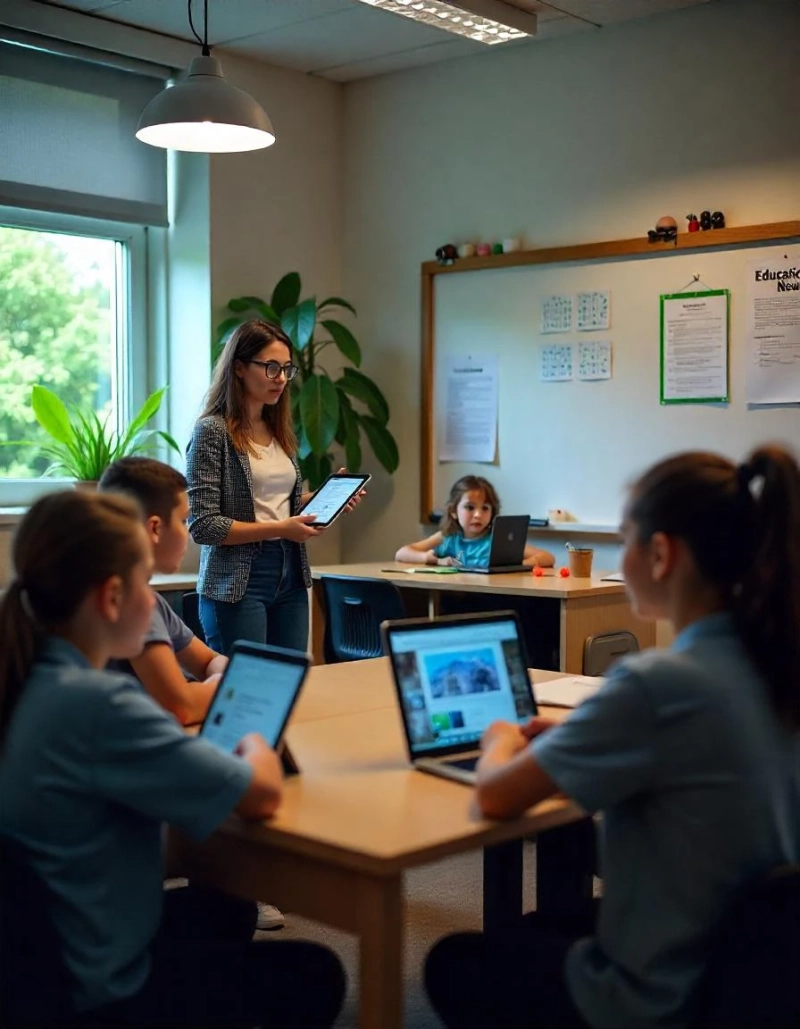Education in 2025 looks very different than it did just a few years ago. From digital learning tools and AI tutors to evolving teaching methods, students and teachers across India—and really, across the world—are navigating an education system that’s transforming fast.
Whether you're a curious student, a dedicated teacher, or just someone interested in what’s going on in the academic world, this article breaks down the most important shifts, trends, and conversations happening right now. And no, this isn’t just another boring summary. Think of this as a friendly catch-up over coffee, but with facts, insights, and a few honest opinions too.
The Rise of Hybrid Learning Isn’t Just a Pandemic Phase
Remember when online classes were a temporary fix? Yeah, that’s long gone.
These days, hybrid learning—a mix of online and offline teaching—isn’t just common, it's preferred in many schools and colleges. Students like it because of the flexibility. Teachers like it because they can use more digital resources and creative formats. And let's be honest—no one misses chalk dust.
Apps like Byju’s, Unacademy, and Google Classroom have become mainstream tools, not backup plans. What started as a response to lockdowns has turned into a permanent part of the learning culture.
Teachers Are Becoming Digital Natives (Whether They Like It or Not)
A few years ago, watching some teachers struggle with Zoom was kind of painful. Now? Many of them are pros at conducting classes online, using presentation tools, and even managing interactive quizzes mid-session.
Training programs and workshops have helped a lot. The government’s DIKSHA platform, for example, has supported thousands of teachers with free digital training.
But the shift isn’t just technical—it’s cultural too. Teachers aren’t just lecturers anymore; they’re mentors, guides, and content curators. They’re working harder to make learning engaging, using memes, short videos, even pop culture references.
And honestly? It’s working.
Exams and Marks Aren’t Everything Anymore
Here’s something that would’ve sounded crazy ten years ago: students can now get into top universities without traditional board exam scores.
Shocking? Maybe. But it’s happening.
Thanks to initiatives like the CUET (Common University Entrance Test), a student's fate isn’t decided by just one set of marks. Skills, portfolios, and practical knowledge are slowly becoming just as important.
Even employers are catching on. Many startups and companies today don’t care as much about degrees or grades. They want to see what you can do—not just what you memorized in school.
That shift has opened new doors, especially for students from smaller towns and less privileged backgrounds. The system isn’t perfect yet, but it’s moving in a better direction.
Mental Health in Classrooms Is Finally Getting Attention
Let’s face it—school and college can be incredibly stressful. Exams, peer pressure, career confusion, family expectations... it builds up.
Thankfully, mental health is no longer a taboo topic in education. More schools are hiring counselors, offering well-being sessions, and even introducing “happiness classes” (yes, that’s a real thing).
In Delhi, for example, several government schools have added Mindfulness Periods to help students manage stress. Private institutions are also pushing for regular wellness check-ins and open discussions.
And students? They're opening up more too. It’s no longer “weak” to ask for help. It’s smart.

AI and EdTech Are Changing How We Learn—Fast
Let’s talk tech for a second.
AI tutors like Khanmigo (from Khan Academy) or language-learning bots on Duolingo are insanely smart. They personalize feedback, track your progress, and even adjust difficulty levels to match your skills.
That means no more one-size-fits-all learning. You can literally have a math class tailored to you.
Smartboards, VR-based history lessons, coding classes using gamified apps—education is finally catching up to the tech world. And while there’s still a digital divide (more on that in a second), the tools we have today are game-changers.
Oh, and here’s where we naturally slip in that one required keyword:
In the midst of all these shifts, the latest education news continues to reflect a strong focus on personalized learning and inclusive teaching methods.
See? Smooth and subtle.
The Digital Divide Is Still a Huge Problem
Okay, real talk—while all this innovation sounds great, it’s not equally available to everyone.
Many students in rural or low-income areas still struggle with basic internet access. Sharing one phone among three siblings, attending classes without a laptop, relying on patchy network—this is the daily reality for millions.
And let’s not forget the teachers trying to manage online classes without proper tools or training. The digital gap is very real, and it needs more attention.
Government schemes like PM eVIDYA and NGO efforts are helping bridge the gap, but there’s a long way to go. If India really wants to modernize education, equal access has to come first.
What Students and Teachers Are Saying
Instead of just quoting reports, let’s hear it straight from the people who matter most:
Ananya, a Class 10 student in Himachal Pradesh:
"Online classes saved me time, but I still miss real school. Hybrid is the best mix."
Mr. Sharma, a chemistry teacher in Delhi:
"I had to learn everything from scratch—Google Meet, Jamboard, all of it. But now, I enjoy mixing tech into my lessons. The kids are more interested too."
Priya, a college student in Mumbai:
"Marks still matter, but I’m focusing more on projects and internships. That’s what companies look at now."
These voices reflect a bigger truth: change is here, and people are adapting in real time.
Final Thoughts: It’s Not Perfect, But It’s Progress
Let’s be honest—education in India still has its share of problems. Not everyone has equal access, and change takes time. But there’s no denying that things are moving in a better direction.
Students and teachers are adapting. Tools are improving. And new ideas—like Story Scape-style learning that makes lessons feel more like experiences—are quietly reshaping how we think about education.
It’s not perfect, but it’s progress. And as long as we keep learning, questioning, and staying open to change, we’re headed the right way.



